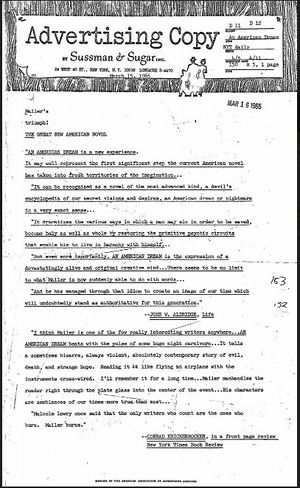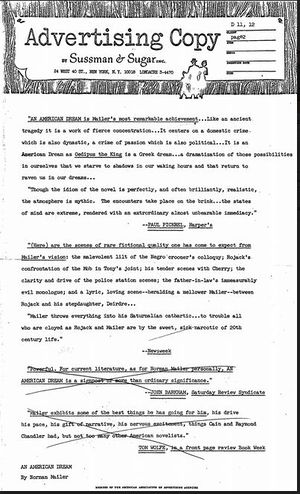An American Dream Expanded/Advertising Copy
Appearance

This page is part of
An American Dream Expanded.
An American Dream Expanded.

From: Sussman & Sugar Inc., March 15, 1965. Advertising copy for the New York Times.
| “ | AN AMERICAN DREAM is a new experience. It may well represent the first significant step the current American novel has taken into fresh territories of the imagination…It can be recognized as a novel of the most advanced kind, a devil’s encyclopedia of our secret visions and desires, an American dream or nightmare in a very exact sense…It dramatizes the various ways in which a man may sin in order to be saved, become holy as well as whole by restoring the primitive psychic circuits that enable him to live in harmony with himself…But even more importantly, AN AMERICAN DREAM is the expression of a devastatingly alive and original creative mind…There seems to be no limit to what Mailer is now suddenly able to do with words.And he has managed through that idiom to create an image of our time which will undoubtedly stand as authoritative for this generation. | ” |
| — John W. Aldridge, Life | ||

| “ | I think Mailer is one of the few really interesting writers anywhere….AN AMERICAN DREAM beats with the pulse of some huge night carnivore…It tells a sometimes bizarre, always violent, absolutely contemporary story of evil, death, and strange hope. Reading it is like flying an airplane with the instruments cross-wired. I’ll remember it for a long time… Mailer manhandles the reader right through the plate glass into the center of the event…His characters are semblances of our times more true than most…. Malcom Lowry once said that the only writers who count are the ones who burn. Mailer burns.” | ” |
| — Conrad Knickerbocker, New York Times Book Review | ||

| “ | AN AMERICAN DREAM is Mailer’s most remarkable achievement…Like an ancient tragedy it is a work of fierce concentration…It centers on a domestic crime-which is also dynastic, a crime of passion which is also political…It is an American Dream as Oedipus the King is a Greek dream…a dramatization of those possibilities in ourselves that we starve to shadows in our waking hours and that return to raven us in our dreams… Thought the idiom of the novel is perfectly, and often brilliantly, realistic, the atmosphere is mythic. The encounters take place on the brink…the states of mind are extreme, rendered with an extraordinary almost unbearable immediacy. | ” |
| — Paul Pickrel, Harper’s | ||

| “ | (Here) are the scenes of rare fictional quality one has come to expect from Mailer’s vision: the malevolent lilt of the Negro’ crooner’s colloquy; Rojack’s confrontation of the mob in Tony’s joint; his tender scenes with Cherry; the clarity and drive of the police station scenes; the father-in-law’s immeasurable evil monologue’ and a lyric, loving scene—heralding a mellower Mailer—between Rojack and his stepdaughter, Deirdre… Mailer throws everything into his Saturnalian cathartic…to trouble all who are cloyed as Rojack and Mailer are by the sweet, sick-narcotic of 20th century life. | ” |
| — Newsweek | ||
